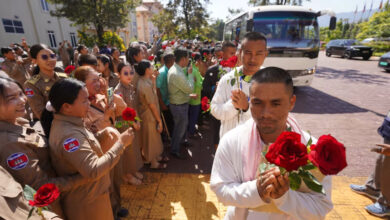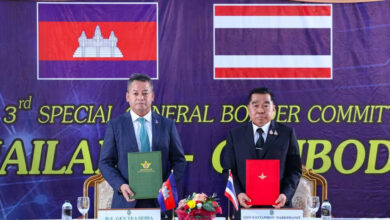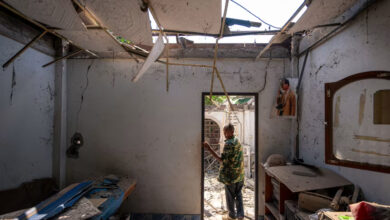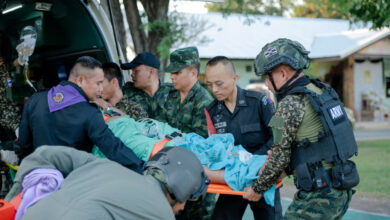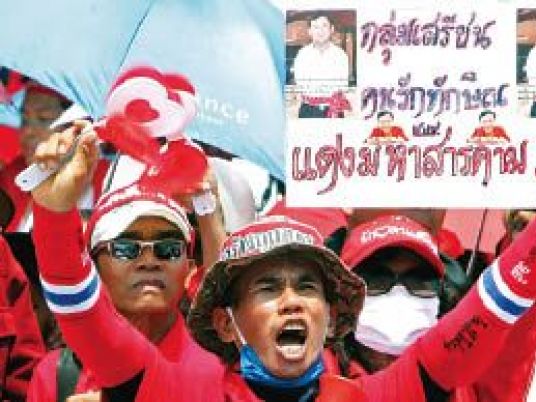
A leader of Thailand's pro-government "Red Shirt" movement was wounded on Wednesday in a shooting in the northeast, stirring tensions as opposition protesters ignored a state of emergency imposed in the capital.
Local radio host Kwanchai Praipana, one of the main figures behind the Red Shirts' mass rallies in 2010 in Bangkok that ended in a bloody military crackdown, was shot in the shoulder and knee by an unidentified man, police said.
"It's likely that the motive for the shooting is political," Police Colonel Kowit Charoenwattanasak told AFP by telephone from the province of Udon Thani, adding Kwanchai's life was not in danger.
The attack came as a state of emergency went into force in Bangkok and nearby areas to deal with mass protests trying to force Prime Minister Yingluck Shinawatra from office.
The Red Shirts are broadly loyal to Yingluck's older brother Thaksin Shinawatra, who was ousted as prime minister by the military seven years ago and lives in Dubai to avoid a jail term for corruption.
While they have largely remained on the sidelines during the current protests, Red Shirt leaders have warned that their supporters could rise up if a government which they helped to elect is removed from power again.
Yingluck is under intense pressure to step down after more than two months of street rallies aimed at ousting her elected government and installing an unelected "people's council".
"We're not taking any notice of the state of emergency and are continuing our protest as usual," rally spokesman Akanat Promphan told AFP.
"It shows that the government is getting desperate because the momentum is with us."
Nine people have been killed and hundreds injured in grenade attacks, drive-by shootings and street clashes since the rallies began at the end of October.
The backdrop to the protests is a years-long political struggle pitting the kingdom's royalist establishment against Thaksin, a billionaire tycoon-turned-politician.
Government vows 'utmost restraint'
The 60-day state of emergency hands broad powers to the security forces.
When the decree was last imposed by the previous government during "Red Shirts" rallies in 2010, more than 90 people were killed and nearly 1,900 injured in a crackdown by soldiers firing live rounds and backed by armoured vehicles.
But Yingluck's government said Wednesday that, unlike on that occasion, it had no plans to impose a curfew, restrict public gatherings or censor media.
"The decree is meant to be a deterrent. In no way should there be the use of force, and utmost restraint will be the order of the day," Foreign Ministry Permanent Secretary Sihasak Phuanggetkeow told reporters.
Yingluck has called an election for February 2 but the main opposition party is boycotting the vote.
The Election Commission on Wednesday asked the Constitutional Court to delay the polls due to the unrest, after the government rejected its call for a postponement.
The demonstrators have staged a self-styled "shutdown" of Bangkok since January 13, erecting roadblocks and rally stages at several main intersections.
The number of protesters on the streets has steadily fallen in recent days, with some rally sites almost deserted during the daytime, although turnout tends to swell in the evening when people leave work.
The imposition of the emergency decree appears to be "an exercise intended most immediately to dispel the perception that the government have got their heads down in a bunker somewhere", said Anthony Davis, a Thailand-based security analyst at IHS Jane's.
"This says that they are focused and serious about taking the situation in hand in the run-up to the election date," he told AFP.
"There's not going to be a crackdown at this stage," he added. "The police frankly don't have what it takes unless they know the army is behind them. And the army isn't behind them."
The military, traditionally a staunch supporter of the anti-Thaksin establishment, has said it wants to remain neutral during the current standoff, although the army chief has refused to rule out another coup to seize power from Yingluck.
The demonstrators accuse the premier of being a puppet for her brother, who still has strong electoral support in northern Thailand thanks to his policies to help the rural poor.

